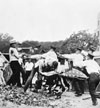





|
The prosperity of the 1920s ended with an economic
catastrophe of unequaled length and severity - the Great Depression.
By 1933 industrial production had fallen to one-third its pre-Depression
levels, thousands of banks were closed, and almost 13 million Americans
were jobless.
There are 11 images in this gallery, click on image
to enlarge.
|
|
"Bonus Marchers" and police battle in
Washington, DC. The marchers came to Washington, DC, to demand their
veterans "bonus" payment early from Congress. After several months
of camping near the Anacostia River and after several confrontations
with police, federal troops drove the marchers from the city.
By an unknown Associated Press photographer, July 1932
National Archives and Records
Administration, Records of the Office of the Chief Signal Officer
(111-SC-97560) [VENDOR # 68] |
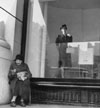
|
"One-third of a Nation"
By Arnold Eagle and David Robbins, 1938
National Archives and Records
Administration, Records of the Work Projects Administration
(69-ANP-1-2329-214) [VENDOR # 66] |
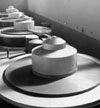
|
"The Pickwick Dam powerhouse contains
four generators with a capacity of 144,000 kilowatts. Two additional
units are scheduled for the plant which will bring the total to
216,000 kw. All T[ennessee] V[alley] A[uthority] installations are
linked into a single system through a network of transmission lines"
By an unknown photographer, Tennessee, not dated
National Archives and Records
Administration-Southeast Region, Records of the Tennessee Valley
Authority
(142-RS-2J-2) [VENDOR # 71] |
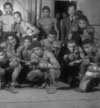
|
"2603 Co. Civilian Conservation Corps
Camp Vermilion, Danville, Ill[inois]. Boxing team. Mr. Taylor, trainer."
By an unknown photographer, 1936-39
National Archives and Records
Administration, Records of the Civilian Conservation Corps
(35-GC-VI-219-D3) [VENDOR # 69] |
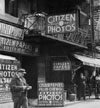
|
"Street corner next to Federal Building
where U.S. Dept. of Labor handles naturalization of immigrants"
By an unknown photographer, New York City, New York, 1939
National Archives and Records
Administration, Records of the National Youth Administration
(119-G-81-M-3) [VENDOR # 73] |

|
"Children and Sugar Beets"
By L.C. Harmon, Hall County, Nebraska, October 17, 1940
National Archives and Records
Administration, Records of the Office of the Secretary of Agriculture
(16-G-Box 159-AAA-6437W) [VENDOR # 75]
|
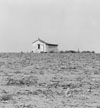
|
"Abandoned house, Haskell County, Kansas"
By Irving Rusinow, April 1941
National Archives and Records
Administration, Records of the Bureau of Agricultural Economics
(83-G-41906) [VENDOR # 76] |

|
"On the freights. He said he quit high
school after two years, hung around home for a couple of years,
and then got work as general kitchen help in a hotel. He had just
been fired from a job of this kind in Los Angeles where he had 'blown
up' and 'told the cook off.' He carried a clean white shirt and
was prepared to look for work when his money was completely gone.
'I don't know where I'll go. Huntin' for a job I guess. I didn't
go home - I'm on the bum. These agency jobs; you gotta buy them
and I ain' got the dough.' He talked about going to Redding, to
Eugene, and to Seattle. He had $1.80. Yuba County, California."
By Rondal Partridge, April 13, 1940
National Archives and Records Administration,
Records of the National Youth Administration
(119-CAL-13) [VENDOR # 74] |
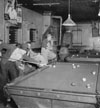
|
"Commercialized entertainment in the village
is confined to the movie house, which has films only once every
two weeks, and the pool hall, which is looked down upon by many
of the community's most substantial citizens. Nevertheless, there
are generally a few players to be seen here in the evenings and
a particularly large group on Saturday night."
By Irving Rusinow, Shelby County, Iowa, May 2-7, 1941
National Archives and Records
Administration, Records of the Bureau of Agricultural Economics
(83-G-44220) [VENDOR # 70] |
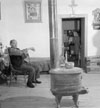
|
"This man is descended from one of the
oldest families in the village, and his house is also one of the
oldest there."
By Irving Rusinow, El Cerrito, San Miguel County, New Mexico, April
10-16, 1941
National Archives and Records
Administration, Records of the Bureau of Agricultural Economics
(83-G-37828) [VENDOR # 72] |
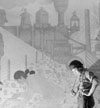
|
"Gerald Nailor, Navajo Artist"
By Milton Snow, Window Rock, Arizona, August 1943
National Archives and Records
Administration, Records of the Bureau of Indian Affairs
(75-NG-4NC-2-14) [VENDOR # 80] |
| |
Back to Top |
|

